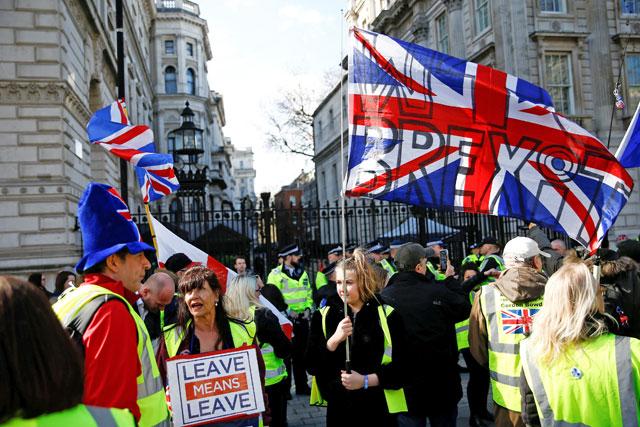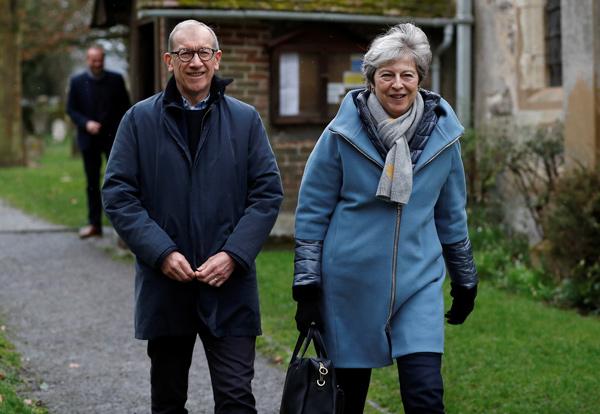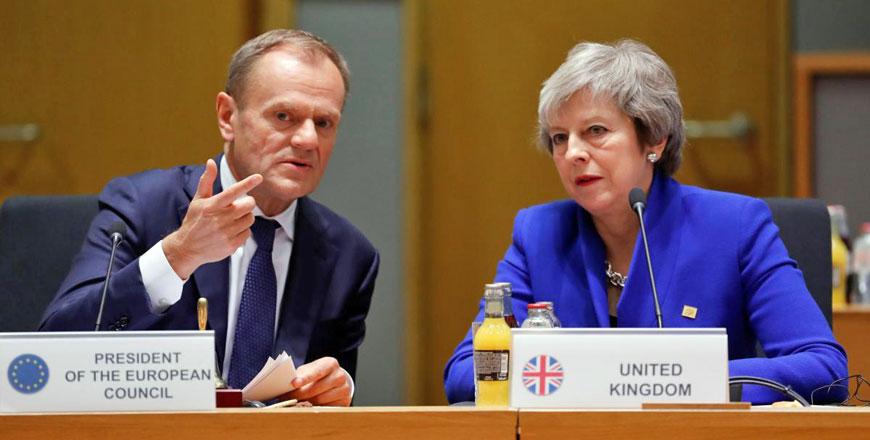You are here
What Brexit game is EU playing? British Parliament leader Leadsom asks
By Reuters - Mar 09,2019 - Last updated at Mar 09,2019

Pro-Brexit protesters demonstrate outside Downing Street in London, Britain, on Saturday (Reuters photo)
LONDON — The leader of Britain's Parliament Andrea Leadsom said she was beginning to wonder what game the European Union was playing over Brexit as relations between London and Brussels deteriorated ahead of a vote by lawmakers next week.
Less than three weeks before Britain is due to leave the EU on March 29, Prime Minister Theresa May has failed to secure the changes to the divorce agreement she needs to gain the support of lawmakers who rejected it in a record rebellion in January.
At the heart of the dispute is a disagreement over how to manage the border between the British province of Northern Ireland and EU-member Ireland.
On Friday, the EU's chief negotiator Michel Barnier put forward a proposal to keep the border open and keep the province subject to EU rules, prompting London to reject it.
"There is still hope, but I have to say I'm deeply disappointed with what we're hearing coming out of the EU," Leadsom told Reuters. "I do have to ask myself what game are they playing here."
Asked who would be to blame if May loses the parliamentary vote again on Tuesday, Leadsom said: “I would point to the EU needing to work closely with us.”
“We are hoping we will be able to win that vote but that does depend on the EU coming to the table and taking seriously the [UK's] proposals.”
Guy Verhofstadt, Brexit coordinator for the European Parliament, backed Barnier.
"He has put forward constructive additions, now we wait for a credible response from the UK to ensure an orderly Brexit," he said on Saturday.
No breakthrough
Talks will continue in Brussels but without a major breakthrough, May looks set to lose her second attempt to get lawmaker's approval and smooth Britain's exit from the EU, its biggest shift in trade and foreign policy in more than 40 years.
The main sticking point is the so-called Northern Irish backstop, an insurance policy to prevent a return of border controls in Ireland that eurosceptics believe is an attempt to trap the country in the EU's customs union indefinitely.
Barnier's solution would potentially create a "border" in the Irish sea between Northern Ireland and the rest of the United Kingdom, a move that is particularly unpalatable to Northern Ireland's Democratic Unionist Party (DUP).
As defenders of the union with Britain, the DUP opposes any change that would treat Northern Ireland differently from the rest of the United Kingdom. May relies on DUP votes to get her legislation passed after she lost her parliamentary majority.
Brandon Lewis, the chairman of May's ruling Conservative Party, said on Saturday the government could never accept a deal which threatened the integrity of the union.
Leadsom said were Britain to leave the EU without a withdrawal deal it would be harder to guarantee the smooth flow of goods and people across the Irish border that has been possible since 1998.
"In making it impossible for us to sign up to that [deal], it actually makes the problems with the Northern Irish border harder to solve, not easier to solve," she said.
May warned on Friday that were lawmakers to reject her deal on Tuesday, it would increase the chance that Brexit never happens, leaving voters feeling betrayed.
If her deal is rejected, lawmakers will be able to vote on Wednesday and Thursday on whether they want to leave the bloc without a deal or ask for a delay to Brexit beyond March 29 — all but wresting control of Brexit from the government.
Related Articles
LONDON — Brexit-supporting lawmakers who voted down British Prime Minister Theresa May's European Union withdrawal deal in January have outl
BRUSSELS — European Union leaders warned the British parliament not to wreck Theresa May’s Brexit deal, saying a package agreed with the pri
LUXEMBOURG — A Brexit deal could yet be reached this week, the chief EU negotiator said on Tuesday, but member states warned they will not a

















